
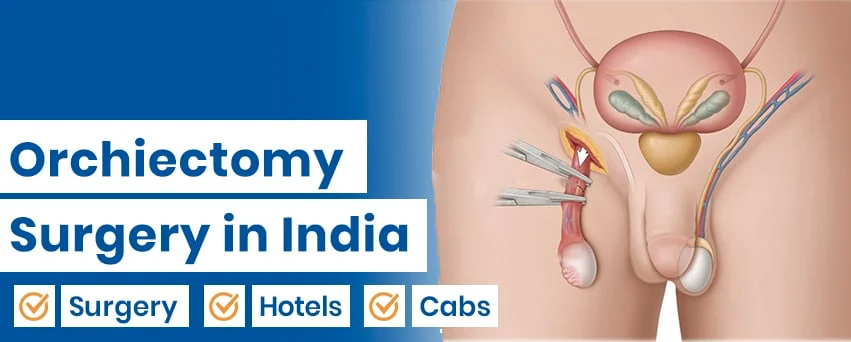
An orchiectomy is a surgery involving the removal of one or both testicles. It is performed to treat conditions such as prostate cancer, testicular cancer, and, in rare cases, breast cancer in men. Laparoscopic orchiectomy is a minimally invasive treatment that is often used for testicular cancer, with faster recovery and reduced discomfort. Some transgender women also choose orchiectomy as part of their gender-affirming transition. It is a short procedure and does not require any overnight hospital stay.
Patients from African countries choose India for orchiectomy surgery because of the country's affordability, medical expertise, and healthcare facilities. India offers high-quality treatment at very low costs when compared to many Western countries, making it accessible for international patients. Indian hospitals are equipped with modern medical technology and internationally accredited urologists and oncologists who have extensive experience in performing orchiectomy procedures. Shorter waiting times, comprehensive medical tourism support, and english-speaking medical staff make India one of the leading choices for African patients wanting safe, effective, and timely medical care.
The orchiectomy definition involves surgically removing one or both testicles. The scrotum, a bag of skin below the penis, carries the 2 tiny organs known as the testicles. Male hormones like testosterone are produced using the testicles, regularly known as the testes.
Medical professionals perform orchiectomies to treat or prevent male breast cancer. It also treats prostate cancer and testicular cancer. An orchiectomy is often an outpatient procedure, meaning you return home the same day.
An orchiectomy surgery in India might be performed for a number of reasons, including:
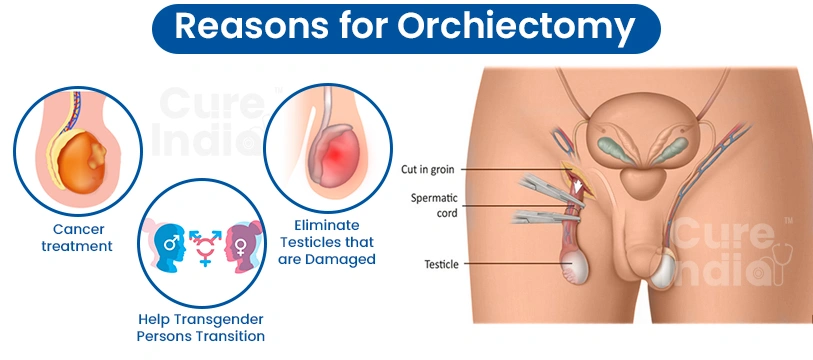
The first line of diagnosis and treatment for testicular cancer is an orchiectomy. In addition to removing the main cancer, this enables the pathologist to view tissue for diagnosis. Furthermore, it is used to treat prostate and breast cancer in men. Some cancer cells are encouraged to develop by androgens, which are masculine hormones like testosterone. Hormone levels fall after the testes are removed.
Many transgender women (or trans women) decide to have an orchiectomy as part of their transition process. This treatment may be performed as a single orchiectomy surgery by medical professionals. Alternatively, they can carry it out as a component of a full gender affirmation procedure. An orchiectomy significantly lowers the body's amounts of male hormones along with causing physical changes.
Trauma, motorbike accidents, and sports-related traumas can seriously harm testicles. A medical professional will remove the testicle. He will suture the surrounding tissues if they are unable to repair it. Rarely could medical professionals have to remove a testicle that hasn't descended.
There are a few different types of orchiectomy procedures. It depends on your condition or the purpose of the treatment:
There is a tiny incision made in your scrotum to remove one or both testicles. Your doctor might want to reduce the quantity of testosterone your body produces. It can be done to treat breast cancer. It may also be done to treat prostate cancer.
Rather than using your scrotum, a tiny incision is made in the lower abdomen. It is done to remove one or both of your testicles. This procedure is called radical orchiectomy. It could be carried out after you discover a lump there. Your doctor might want to check your testicular tissue for cancer with this method.
The scrotum's surrounding tissues are removed to reveal the testicles. This enables you to maintain the integrity of your scrotum. No visible evidence of its removal is visible with this.
The testicles are cut off. If you are changing from male to female or have breast or prostate cancer, this procedure may be necessary.
Your doctor could perform this procedure to treat prostate or breast cancer. The testicles are necessary for your body. These produce enough testosterone. One hormone that can speed up the spread of breast or prostate cancer is testosterone. In the absence of testosterone, the cancer might spread more slowly. Some symptoms, such as bone pain, might be easier to handle.
Your doctor can suggest an orchiectomy if you are in good health. If the cancer cells have not progressed too far beyond your prostate gland orchiectomy will be suggested. The same applies if it isn’t spread beyond your testicles.
You might want to consider having an orchiectomy if you are changing from a man to a female. In this way, you can lower the amount of testosterone your body produces.
Orchiectomy is a serious surgical procedure performed for testicular cancer, gender-affirming care, or other medical conditions. In India, there are many highly trained urologists and oncologists who specialise in performing genital and reproductive surgery. They provide professional treatment, postoperative care, and psychological support when needed. Let us hear from some of our top doctors for orchiectomy surgery in India:
Dr. Gautam Banga is an expert urologist in India, specialising in performing orchiectomy procedures. Known for his precision and patient-centric treatments, he has successfully treated thousands of patients with excellent results.

Dr. Raman Tanwar is an experienced surgeon in orchiectomy procedures. Till date he has been awarded 5 gold medals in Urology and is a panellist for the national guidelines on male sexual health.
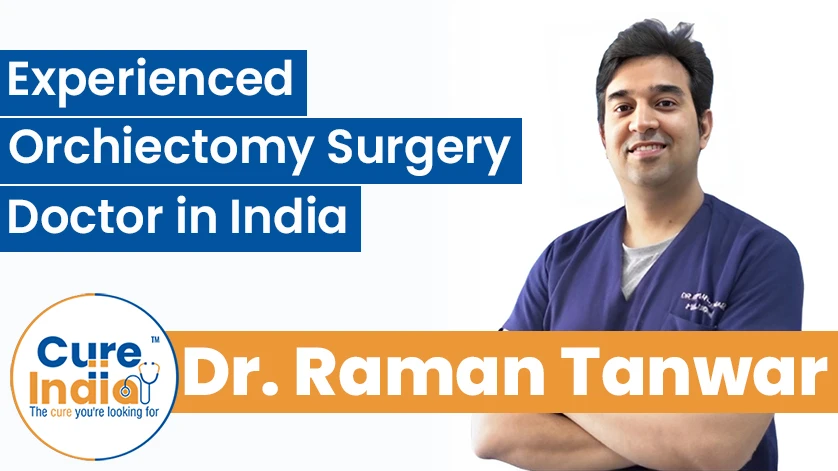
Dr. Rajiv Yadav is a leading urologist in India specialising in orchiectomy procedures. With over 20 years of extensive surgical experience, he tailors safe and effective treatments to meet the unique needs of each patient.
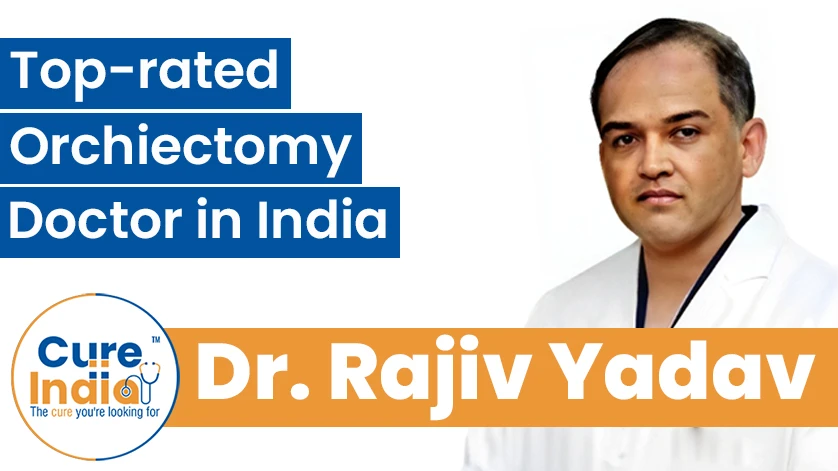
Dr. Sanjay Gogoi is recognised for his expertise in orchiectomy surgery. With his experience of 25+ years, he is recognised for integrating advanced surgical techniques with patient-centric care and high success rates for the best results.

Now you are given the go-ahead to have an orchiectomy. Then the medical expert will provide specific advice on how to get ready for the procedure. They will also go over what to anticipate following the procedure and how long it will take.
A medical practitioner could restrict the food and liquid consumption of the patient before surgery.
The patient will be given a general or local anesthetic before the orchiectomy surgery. After the procedure, patients should decide on transport home. They shouldn't drive or handle machines until the anesthetic wears off.
Your medical professional cuts and cleans the area. The technique your healthcare professional uses will determine where the incision is made. An incision can be made in the scrotum (simple orchiectomy) or the pubic region (inguinal orchiectomy). Your medical professional might take away the following:
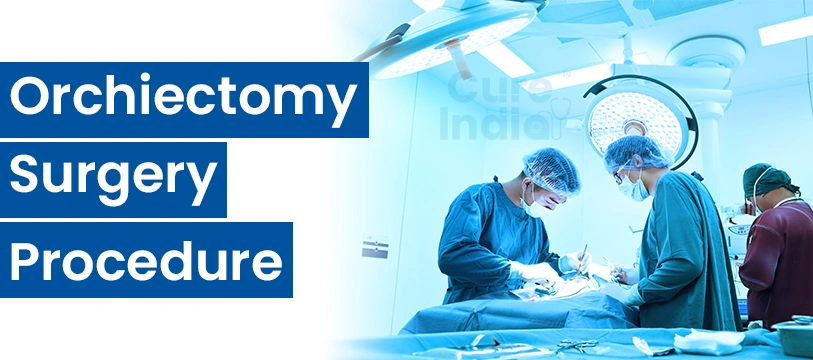
There are nerves and blood arteries in the spermatic cord. It transports semen from the penis to the testicles.
In the event, you might receive a prosthetic testicle. Your doctor will insert the replacement testicle into your scrotum. Salted water, or saline, fills the prosthetic testicle.
Your healthcare provider sews the incision shut after the surgery. The entire process typically takes half an hour to an hour. You will have to stay in the recovery room until you are well enough to go after the procedure. Most patients leave the hospital on the same day.
After the orchiectomy surgery, as an inpatient, the patient is taken to a recovery room. There a physician or nurse will oversee their recovery. Most likely, they will spend the night in the hospital. Upon completion of an outpatient orchiectomy treatment, the patient can return home a few hours later. They must, however, come back for a follow-up so a medical expert can assess their level of recovery. Following an orchiectomy, some pain and tenderness are common. If the discomfort is severe, they should see a medical expert. After an orchiectomy, recovery can take upto two to eight weeks.
You will receive comprehensive information. It is about the recuperation procedure from a medical specialist. These guidelines may consist of:
The total cost of orchiectomy surgery in India with CureIndia includes surgeon’s fees, anaesthesia, hospital stay, basic post‑operative care and medications. However, the final amount depends on several variables, whether it’s a unilateral or bilateral orchiectomy, the type of hospital, room type, pre‑surgery investigations, the patient’s general health condition, and any additional procedures. The average cost of orchiectomy surgery in India, along with the total stay, is mentioned below:
| Treatment Name | Cost in India | Stay in India |
|---|---|---|
| Orchiectomy Surgery in India | $2,500 | 7 Days |
After the process, you may require a driver to get you home. Although patients recover rapidly, the entire method typically takes numerous weeks. After the process, you will need to make an appointment to comply with-up go to with your healthcare doctor. While you heal, you need to:
After the surgical procedure, wear loose-fitting clothing. You need to take it smooth for a few days. You must refrain from strolling, having intercourse, and heavy lifting for some weeks. Find out from your health practitioner when you can resume gambling sports activities and different activities.
Cleanse and dry the area: When taking care of your incision, do as directed by way of your healthcare practitioner. When taking a shower, use cleaning soap and water and wrap the affected vicinity with gauze. After surgical treatment, you would possibly need to wear a special garment for 48 hours to guide your scrotum.
After the method, there may be a few aches, discomfort, or pain. Use nonsteroidal anti-inflammatory medicines (NSAIDs). You can also use over-the-counter acetaminophen to reduce pain and swelling. During the first 24 hours, follow ice packs to the affected location every 20 minutes.
Maintain proper diet and hydration: When pooping, it is important to chorus from the use of immoderate force. Consume ingredients excessive in fiber. Drink masses of water to assist in keeping regularity and stave off constipation.


Suffering from Erectile Dysfunction
Open up and get treated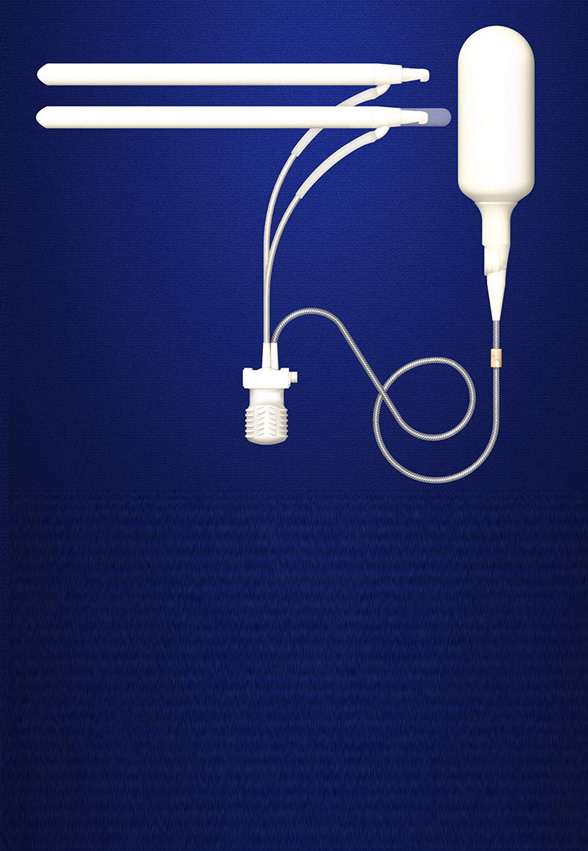
Semi Rigid and Inflatable Penile Implants
Get back the Erection
Insecure about your size
Get Penile Augmentation